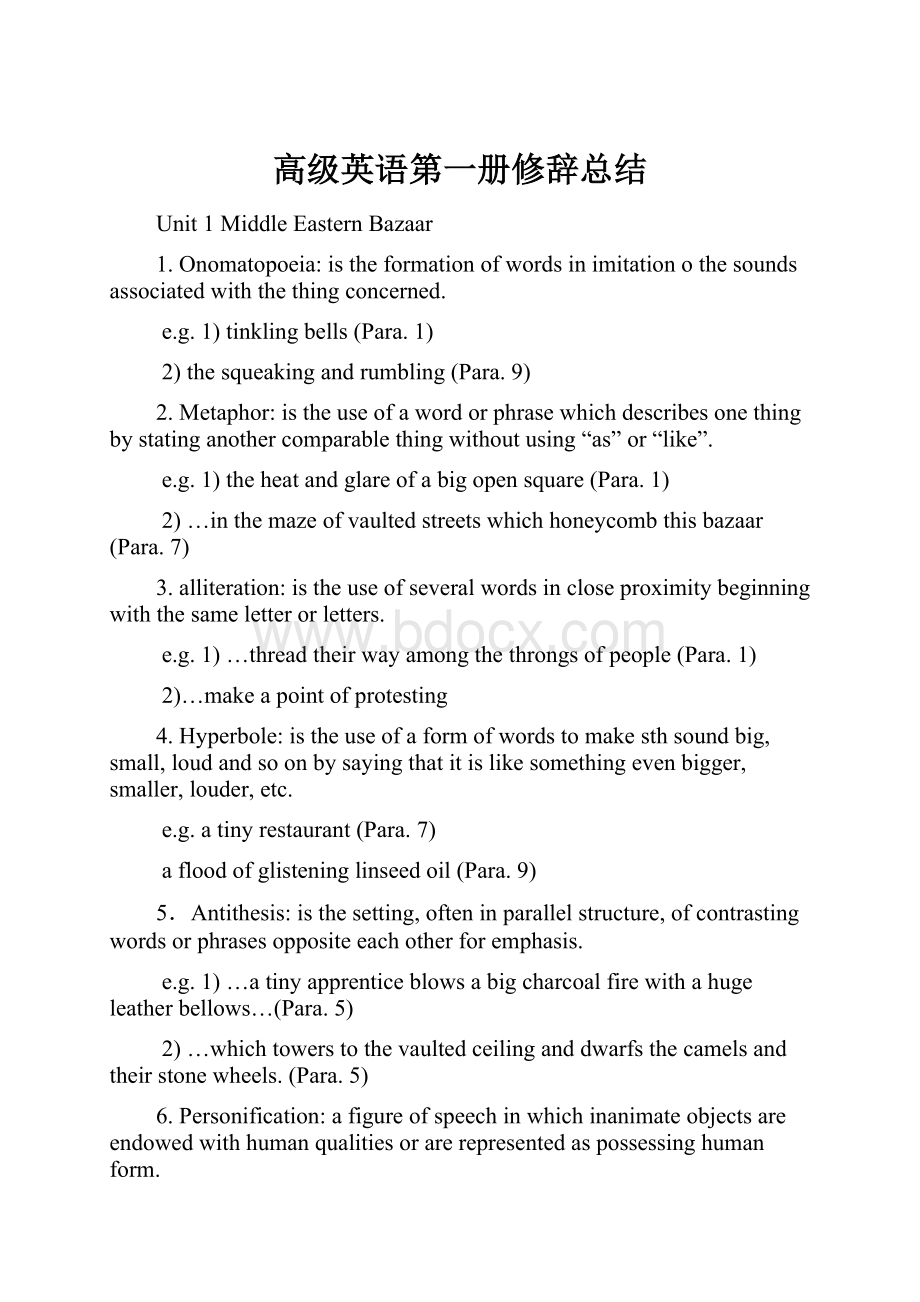高级英语第一册修辞总结.docx
《高级英语第一册修辞总结.docx》由会员分享,可在线阅读,更多相关《高级英语第一册修辞总结.docx(14页珍藏版)》请在冰豆网上搜索。

高级英语第一册修辞总结
Unit1MiddleEasternBazaar
1.Onomatopoeia:
istheformationofwordsinimitationothesoundsassociatedwiththethingconcerned.
e.g.1)tinklingbells(Para.1)
2)thesqueakingandrumbling(Para.9)
2.Metaphor:
istheuseofawordorphrasewhichdescribesonethingbystatinganothercomparablethingwithoutusing“as”or“like”.
e.g.1)theheatandglareofabigopensquare(Para.1)
2)…inthemazeofvaultedstreetswhichhoneycombthisbazaar(Para.7)
3.alliteration:
istheuseofseveralwordsincloseproximitybeginningwiththesameletterorletters.
e.g.1)…threadtheirwayamongthethrongsofpeople(Para.1)
2)…makeapointofprotesting
4.Hyperbole:
istheuseofaformofwordstomakesthsoundbig,small,loudandsoonbysayingthatitislikesomethingevenbigger,smaller,louder,etc.
e.g.atinyrestaurant(Para.7)
afloodofglisteninglinseedoil(Para.9)
5.Antithesis:
isthesetting,ofteninparallelstructure,ofcontrastingwordsorphrasesoppositeeachotherforemphasis.
e.g.1)…atinyapprenticeblowsabigcharcoalfirewithahugeleatherbellows…(Para.5)
2)…whichtowerstothevaultedceilinganddwarfsthecamelsandtheirstonewheels.(Para.5)
6.Personification:
afigureofspeechinwhichinanimateobjectsareendowedwithhumanqualitiesorarerepresentedaspossessinghumanform.
e.g.…astheburnishedcoppercatchesthelightof…(Para.5)
Unit2
V:
Figuresofspeech
Metaphor:
暗喻
Afigureofspeechinwhichawordorphrasethatordinarilydesignatesonethingisusedtodesignateanother,thusmakinganimplicitcomparison.
暗喻是一种修辞,通常用指某物的词或词组来指代他物,从而暗示二者之间的相似之处。
1).Andsecondly,becauseIhadalumpinmythroatandalotofsadthoughtsonmymindthathadlittletodowithanythinginNipponrailwaysofficialmightsay.
2).…Iwasagaincrushedbythethought…(Page13,Para.4,Line1)
3).…Atlasttheintermezzocametoanendand…(Page13,Para.4,Line1)
4).…whenthemeaningoftheselastwordssankin,joltingme…(Page15,Para.7,Lines1~3)
Synecdoche:
提喻
Afigureofspeechinwhichapartisusedforthewhole(ahandforsailor),thewholeforapart(asthelawforpoliceofficer),thespecificforthegeneral(ascutthroatforassassin),thegeneralforthespecific(asthiefforpickpocket),orthematerialforthethingfromwhichitismade(assteelforsword).
举隅法,提喻法:
一种修辞方法,以局部代表整体(如用手代表水手),以整体代表局部(如用法律代表警官),以特殊代表一般(如用直柄剃刀代表杀人者),以一般代表特殊(如用贼代表扒手),或用原材料代表用该材料制造的东西(如用钢代表剑)
e.g.TheratherarrestingspectacleoflittleoldJapanadriftamidbeigeconcreteskyscrapersistheverysymboloftheincessantstrugglebetweenthekimonoandtheminiskirt.(Para.7)
littleoldJapan:
traditionalJapanesehouses
Metonymy:
换喻
Afigureofspeechinwhichonewordorphraseissubstitutedforanotherwithwhichitiscloselyassociated,asintheuseof“Washington”for“theUnitedStatesgovernment”orof“thesword”for“militarypower”.
换喻,转喻:
一种一个词或词组被另一个与之有紧密联系的词或词组替换的修辞方法,如用“华盛顿”代替“美政府”或用“剑”代替“军事力量”
TheratherarrestingspectacleoflittleoldJapanadriftamidbeigeconcreteskyscrapersistheverysymboloftheincessantstrugglebetweenthekimonoandtheminiskirt.(Para.7)
thekimonoandtheminiskirt:
theJapanesecultureandthewesternculture
Irony:
反语
Theuseofwordstoexpresssomethingdifferentfromandoftenoppositetotheirliteralmeaningtoachievethehumorousandironiceffect.
反语:
用词语表达与它们的字面意思相异或相反的用法,以达到幽默和讽刺的效果。
e.g.ThiswayIlookatthemandcongratulatemyselfonthegoodfortunethatmyillnesshasbroughtme.(P.17)
Climax:
层进法
Aseriesofstatementsorideasinanascendingorderofrhetoricalforceorintensity.
层进法:
在不断增强的修辞力度或强度中使用的一系列陈述和方法
Noonetalksaboutitanymore,andnoonewantsto,especiallythepeoplewhowerebornhereorwholivedthroughit.(page15~16,Para.12,Lines1~3)
Anti-climax:
渐降
Anti-climax,asusedinthetext,statesone’sthoughtsinadescendingorderofsignificanceorintensityfromstrongtoweak,fromweightytolight.Ithasachievedahumorousorsurprisedorevenasarcasticeffectwhenthemayorwasintroducinghiscitytothevisitors,whowereexpectinghisanswertohavesomethingtodowiththeatombomb,butwhoironicallyheard“oysters”intheend.
渐降表述概念的方式是使意义强烈的语言按照步步降低的语气顺序排列,语势由强而弱,语气由重到轻,有此达到取笑、讽刺或是喜剧的效果。
e.g.“seldomhasacitygainedsuchworldrenown,andIamproudandhappytowelcomeyoutoHiroshima,atownknownthroughouttheworldforits—oysters.”(p.15)
Sarcasm讽刺isanexpressionorcuttingremarkclearlymeaningtheoppositetowhatisfelt.
Hiroshima—the“liveliest”CityinJapan(hyperbole)
Ifyouwanttowritethiscity,donotforgettosaythatthiscityisthegayestcityinJapan,evenif…(hyperbole)
Simile明喻isanexpressionmakingacomparisonintheimaginationbetweentwothingsusingthewordsasorlike
e.g.Seriouslookingmenspoketooneanotherasiftheywereobliviousofthecrowdsaboutthem…
Unit3ShipsintheDesert
Personification
e.g.1)Wherethereshouldhavebeengentleblue-greenwaveslappingagainstthesideoftheship,therewasnothingbuthotdrysand.(Para.1)
Hyperbole
e.g.thepopulationexplosion(Para.5)
Metaphor
1)anotherghostlyimage(Para.6)
2)theseghostsinthesky(Para.8)
Metonymy
1)therelationshipbetweenthetwosuperpowers(Para.23)
Unit5SpeechonHitler’sInvasionoftheU.S.S.R.
IV:
Rhetoricaldevices
1.Periodicsentences:
Periodicsentencesachieveforcefulnessbysuspense(悬念).Theessentialelementsinthesentencearewithhelduntiltheend.
Asentenceinwhichthemainclauseoritspredicateiswithhelduntiltheend;周期句(掉尾句):
主句或谓语在句末的句子,有两种句型:
一:
修饰语(尤其是状语)在句首的简单句;二:
从句在前主句在后的复合句
a)Thepast,withitscrimes,itsfollies,anditstragedies,flashesaway.(p.79)
b)AnymanorstatewhofightsonagainstNazidomwillhaveouraid.(p.80)
c)IfHitlerimaginesthathisattackonSovietRussia…heiswoefullymistaken.(p80,L22)
d)WhenIawokenonthemorningofSunday,the22nd,thenews…invasionofRussia.(p.77)
2.Rhetoricalquestion(interrogation)
Interrogationasksaquestionnotinordertoobtainananswer,butforthepurposeofmakinganassertioninastrikingandlivelyway.
E.g.…butcanyoudoubtwhatourpolicywillbe?
3.parallelstructure
a)Wewillneverparley
WewillnevernegotiatewithHitleroranyofhisgang(p.80)
b)weshallfighthimbyland
weshallfighthimbysea
weshallfighthimintheair.(p.80)
c)behindallthisglare
behindallthisstormIsee…(p.80)
d)IseetheRussiansoldiersstanding…
Iseethemguarding…
Iseethetenthousandvillages…
Iseeadvancingupon…(p.79)
4.Inversion
Achangeinnormalwordorder,suchastheplacementofaverbbeforeitssubject
a)Fromthisnothingwillturnus—nothingP.80
5.Repetition
Therepeateduseofthesamesynonymouswords,toaddforce,clearnessorbalancetoasentence
Wehavebutoneaimandonesingle,irrevocablepurpose.(p.78)
Hehassolongthrivedandprospered.(p.81)
Wewillneverparley,wewillnevernegotiate…(p.80)
6.simile
Afigureofspeechinwhichtwoessentiallyunlikethingsarecompared,ofteninaphraseintroducedbylikeoras,asin“Howlikethewinterhathmyabsencebeen”or“Soareyoutomythoughtsasfoodtolife”(Shakespeare).
明喻:
一种修辞手法,把两种基本不相像的东西进行比较,通常在由like或as引导的短语中,如“我的离开好象是冬天来临”或“你对我的思想就象食物对于生命一样重要”(莎士比亚)
Iseealsothedull…Germansoldiers…crawlinglocusts.(p79-80)
7.metaphor
Afigureofspeechinwhichawordorphrasethatordinarilydesignatesonethingisusedtodesignateanother,thusmakinganimplicitcomparison.
暗喻是一种修辞,通常用指某物的词或词组来指代他物,从而暗示二者之间的相似之处。
a)IseetheRussiansoldiersstandingonthethresholdoftheirnativeland…
thresholdreferstothethresholdoftheirnation.(p.79)
b)Behindallthisglare,behindallthisstorm,Iseethatsmallgroupof…(p.80)
Glare:
afierceorangrystare;Hereitreferstowarfire.
Storm:
strongwindandrain;HereitreferstowarorHitler’sassaultontheothercountries.
c)…delightedtofindwhattheybelieveisaneasierandasaferprey(theRussiansoldiers).(p.80)
d)Isupposetheywillberoundedupinhordes.(Page77,Para.1,thelastsentence)
e)WeareresolvedtodestroyHitlerandeveryvestigeoftheNaziregime.(Page80,Para.3,Lines6~8)
f)wehaveridtheearthofhisshadow(influence)andliberateditspeoplesfromhisyoke(control).(p.80)
8.alliteration
Therepetitionofthesameconsonantsoundsorofdifferentvowelsoundsatthebeginningofwordsorinstressedsyllables,asin
头韵:
在一组词的开头或重读音节中对相同辅音或不同元音的重复。
如:
“onscrollsofsilversnowysentences”(HartCrane)
“写满银色雪般句子的卷轴上”(哈特·克兰)
a)Hearthandhome(p.82)
b)Ialsoseethedull,drilled,docile,brutishmassesoftheHunsoldieryploddingonlikeaswarmofcrawlinglocusts.(p.79)
Letuslearnthelessonsalreadytaughtbysuchcruelexperience.(p.82)
9.Personification
Afigureofspeechinwhichinanimateobjectsorabstractionsareendowedwithhumanqualitiesorarerepresentedaspossessinghumanform
IseetheGermanbombersandfightersinthesky,stillsmartingfrommanyaBritishwhipping,delightedtofindwhattheybelieveisaneasierandasaferprey.(p.79-80)
10.hyperbole
Afigureofspeechinwhichexaggerationisusedforemphasisoreffect,asinIcouldsleepforayearorThisbookweighsaton.
夸张法:
一种比喻,使用夸张来强调或产生某种效果,比如在我能睡一年或这书有一吨重中
IfHitlerinvadedHellIwouldmakeatleastafavourablereferencetotheDevilintheHouseofCommons.(Hitlerismuchevilerthanthedevil.)(p.78)
e.g.Iwillloveyoutilltheseasgoesdry,therocksmeltwiththesun.我爱你到海枯石烂
Unit9MarkTwain—MirrorofAmerica
V.Rhetoricaldevices
1.Simile:
PleaserefertoLess